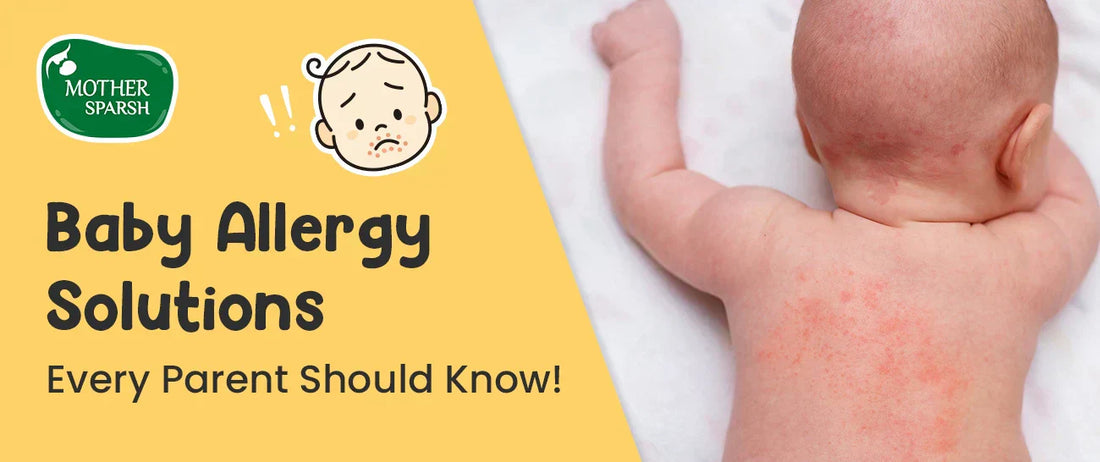
How to Recognize and Manage Baby Allergies: Causes, Symptoms, and Tips
Your baby’s face lights up with their first taste of something new, only to replace it with discomfort—red cheeks, an itchy rash, or tummy troubles. As a mother, there’s nothing more heart-wrenching than seeing your little one in distress, wondering if you missed something or could have prevented it.
Baby allergies can be overwhelming, unpredictable, and at times, frightening. But rest assured, you’re not alone. Whether it's deciphering a rash, calming an upset tummy, or figuring out if it’s just a cold, this guide is here to help. Together, we’ll uncover the signs, solutions, and steps to protect your little one.
Because no one understands your baby’s needs better than you. With a bit of knowledge and guidance, you’ll be empowered to keep them safe, comfortable, and smiling——just as they should be
What Are Baby Allergies?
Baby allergies occur when your child's immune system mistakenly reacts to a harmless substance, such as food, dust, or pet dander as if it were a threat. These allergic reactions can range from mild to severe. However, with early detection and proper baby allergy treatment, they can be effectively managed.
Common Types of Baby Allergies
Babies can develop allergies to a variety of substances, from foods to environmental triggers. Understanding the different types of allergies can help you manage them effectively.
1. Food Allergies
Certain foods are the most common culprits behind baby allergies. The main offenders include:
-
Cow’s milk
-
Eggs
-
Peanuts
-
Tree nuts
-
Soy
-
Wheat
Signs to Watch For:
-
Skin rashes or hives
-
Swelling (especially around the face and lips)
-
Vomiting or diarrhea
-
Breathing difficulties
Note: If you suspect an allergy to milk in babies, consult your pediatrician for advice on alternatives like hypoallergenic formulas. Symptoms such as vomiting, diarrhea, or skin rashes may indicate a milk allergy in babies, so early consultation is crucial.
2. Environmental Allergies
The air around your baby can also be a trigger. Common allergens include:
-
Pollen
-
Dust mites
-
Pet dander
Signs to Watch For:
-
Runny nose
-
Watery, red eyes
-
Sneezing or coughing
-
Skin irritation
3. Skin Allergies
Skin-related allergies can cause visible discomfort. The most common types are:
-
Eczema: Red, dry, itchy patches on the skin.
-
Contact dermatitis: Rashes caused by irritants like certain soaps, fabrics, or fragrances.
Signs to Watch For:
-
Persistent itching
-
Inflamed or bumpy skin
Identifying Allergy Symptoms
Not all rashes or sniffles necessarily indicate allergies. Here's how to distinguish between everyday discomforts and allergy symptoms. If you suspect your child may have allergies, here are some key symptoms to look out for:
Skin Symptoms
-
Rashes or hives, especially on the face, chest, or diaper area.
-
Persistent itching or dry patches.
Digestive Symptoms
-
Vomiting
-
Diarrhea
-
Excessive gas after feeding.
These may indicate symptoms of baby food allergies, particularly if they occur after introducing new foods. Symptoms like an upset tummy or rashes can also be linked to a baby milk allergy.
Respiratory Symptoms
-
Wheezing, coughing, or nasal congestion.
-
Frequent sneezing or a persistent runny nose.
Parental Tip: Trust your instincts. If something doesn’t feel right, consult your doctor for guidance.

Preventing Baby Allergies: Practical Tips
Prevention is better than cure. You can significantly reduce your risk of allergies with simple lifestyle adjustments:
1. Keep Your Home Allergy-Free
-
Vacuum carpets regularly and use washable rugs.
-
Wash bedding in hot water weekly to kill dust mites.
-
Keep stuffed animals and clutter to a minimum.
2. Smart Food Introductions
Introducing solids, including potential allergens like peanuts and eggs, between 4 to 6 months can help reduce allergy risks. Always check with your doctor before adding new foods to your baby’s diet.
3. Breastfeeding Benefits
Breastfeeding exclusively for the first six months of life can strengthen your baby's immune system, potentially reducing their risk of developing allergies, including baby milk allergy.
4. Manage Pet Dander
If you have pets, it is important to keep them out of the nursery and vacuum regularly to minimize allergens like pet dander (dead skin flakes from your pet). With some planning, your baby and pets can coexist happily and healthily.
Managing Baby Allergies: Everyday Solutions
Managing your baby's allergies can feel challenging, but with small, consistent steps, you can navigate these hurdles and ensure your baby's comfort and well-being. Here are some simple solutions to help you manage allergies every day:
For Sensitive Skin
-
Use a fragrance-free, hypoallergenic moisturizer.
-
Apply a cool, damp cloth to soothe itchy or irritated areas.
For Stuffy Noses
-
Use a saline nasal spray or a soft bulb syringe to clear congestion.
For Tummy Troubles
-
Work with your doctor to identify and eliminate trigger foods.
-
Consider hypoallergenic formulas if breastfeeding isn’t an option. This is especially important for managing milk allergy in babies.
Outdoor Tips
-
Check pollen levels before heading out.
-
Dress your baby in long sleeves and rinse them off after outdoor play to minimize exposure.
Creating a Safe Environment for Your Baby
To help your baby grow up happy, healthy, and protected from common allergens, it's crucial to maintain a clean and allergen-free home. Parenting an allergy-prone baby may seem overwhelming, but with a few simple steps, you can make a big difference:
-
Keep a diary to track allergy triggers and symptoms.
-
Regularly clean and reduce allergens in your home.
-
Follow your doctor’s advice and stay proactive.
Remember, you're doing an amazing job! With the right approach, you can ensure your baby stays healthy, happy, and free from allergies.
Points to Remember
-
Watch for skin rashes, digestive issues, and respiratory symptoms. Early detection is key to effective allergy management.
-
Common allergy culprits include food items like milk, eggs, and nuts, as well as environmental factors like dust mites and pet dander.
-
Regular cleaning, decluttering, and using hypoallergenic products can significantly reduce allergens.
-
Introduce potential allergens slowly and one at a time, under your doctor’s guidance.
-
Exclusive breastfeeding for the first six months can strengthen your baby’s immunity and lower the risk of allergies.
-
Trust your instincts and work closely with your doctor to tailor solutions for your baby’s specific needs.





